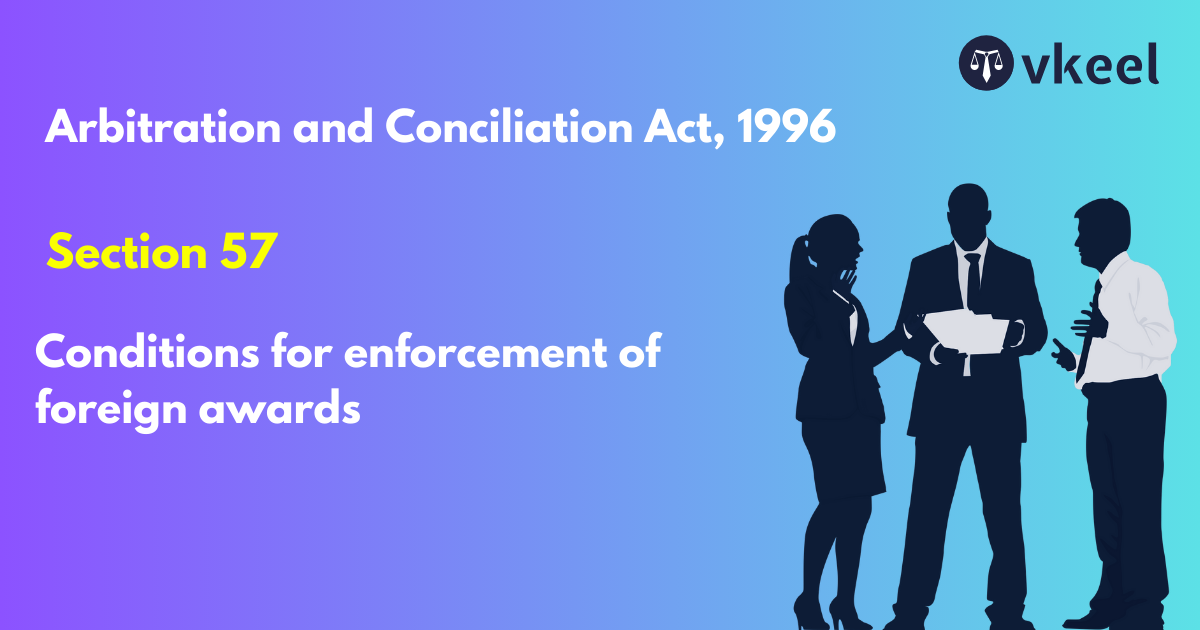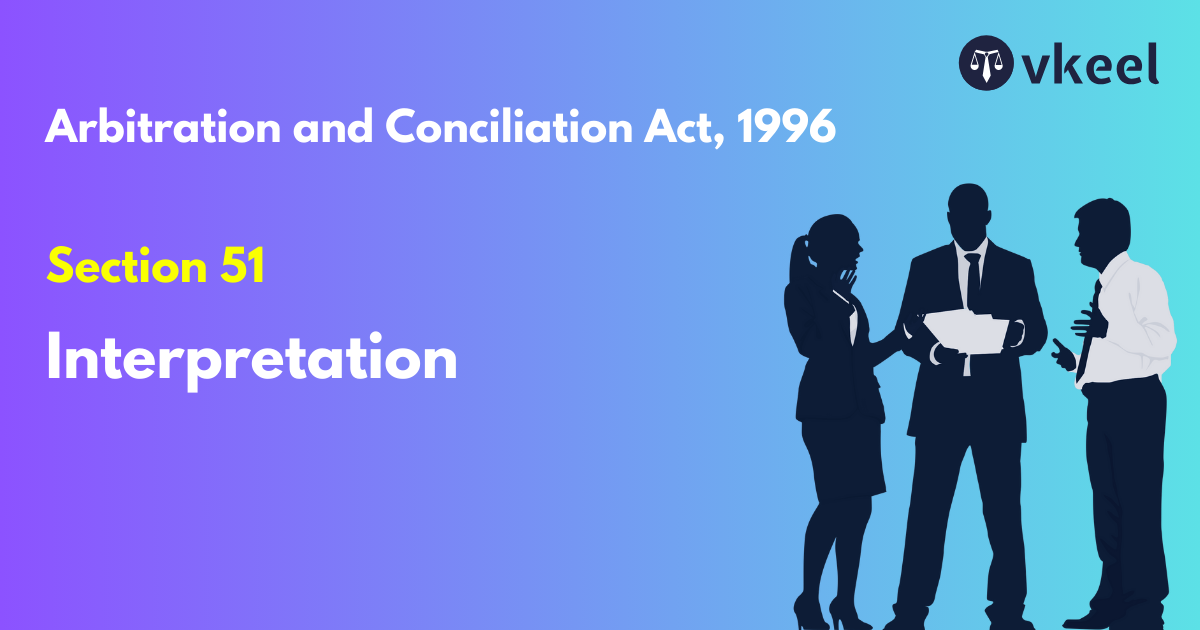Section 2 of The Arbitration and Conciliation Act, 1996
By Nivedita Dhiman
Table of Contents
Introduction
Section 2 of The Arbitration and Conciliation Act, 1996 is an important section as it lays the overall framework of arbitration and conciliation providing key definitions and clarifications used throughout the Act. This section defines important terms which help to interpret the Act’s provisions accurately.
This Section has many sub-sections which define those terms that are central to the Act. This Act reduces doubtfulness and potential disputes by defining terms and also ensuring that the Act is applied consistently.
The definitions in Section 2 are developed so as to ensure compatibility with international arbitration standards and facilitate smooth arbitration processes.
Section 2 of The Arbitration and Conciliation Act, 1996
In this Part, unless the context otherwise requires,
(a) arbitration means any arbitration whether or not administered by permanent arbitral institution;
(b) arbitration agreement means an agreement referred to in section 7;
(c) arbitral award includes an interim award;(ca) [ “arbitral institution” means an arbitral institution designated by the Supreme Court or a High Court under this Act;] [Inserted by Act No. 33 of 2019, dated 9.8.2019.]
(d) arbitral tribunal means a sole arbitrator or a panel of arbitrators;
(e) [ “Court” means- [Substituted by Act No. 3 of 2016 dated 31.12.2015.]
in the case of an arbitration other than international commercial arbitration, the principal Civil Court of original jurisdiction in a district, and includes the High Court in exercise of its ordinary original civil jurisdiction, having jurisdiction to decide the questions forming the subject-matter of the arbitration if the same had been the subject-matter of a suit, but does not include any Civil Court of a grade inferior to such principal Civil Court, or any Court of Small Causes;
in the case of international commercial arbitration, the High Court in exercise of its ordinary original civil jurisdiction, having jurisdiction to decide the questions forming the subject-matter of the arbitration if the same had been the subject-matter of a suit, and in other cases, a High Court having jurisdiction to hear appeals from decrees of courts subordinate to that High Court;]
(f) international commercial arbitration means an arbitration relating to disputes arising out of legal relationships, whether contractual or not, considered as commercial under the law in force in India and where at least one of the parties is
an individual who is a national of, or habitually resident in, any country other than India; or
a body corporate which is incorporated in any country other than India; or
[* * *] [Omitted words ‘a company or’ by Act No. 3 of 2016 dated 31.12.2015.] an association or a body of individuals whose central management and control is exercised in any country other than India; or
the Government of a foreign country;
(g) legal representative means a person who in law represents the estate of a deceased person, and includes any person who inter-meddles with the estate of the deceased, and, where a party acts in a representative character, the person on whom the estate devolves on the death of the party so acting;
(h) party means a party to an arbitration agreement.
(i) [ “prescribed” means prescribed by rules made under this Act; [Inserted by Act No. 33 of 2019, dated 9.8.2019.]
(j) “regulations” means the regulations made by the Council under this Act.]
(2) This Part shall apply where the place of arbitration is in India.[Provided that subject to an agreement to the contrary, the provisions of sections 9, 27 and [clause (b)] [Inserted by Act No. 3 of 2016 dated 31.12.2015.] of sub-section (1) and sub-section (3) of section 37 shall also apply to international commercial arbitration, even if the place of arbitration is outside India, and an arbitral award made or to be made in such place is enforceable and recognized under the provisions of Part II of this Act.]
(3) This Part shall not affect any other law for the time being in force by virtue of which certain disputes may not be submitted to arbitration.
(4) This Part except sub-section (1) of section 40, sections 41 and 43 shall apply to every arbitration under any other enactment for the time being in force, as if the arbitration were pursuant to an arbitration agreement and as if that other enactment were an arbitration agreement, except insofar as the provisions of this Part are inconsistent with that other enactment or with any rules made thereunder.
(5) Subject to the provisions of sub-section (4), and save insofar as is otherwise provided by any law for the time being in force or in any agreement in force between India and any other country or countries, this Part shall apply to all arbitration’s and to all proceedings relating thereto. Construction Of References
(6) Where this Part, except section 28, leaves the parties free to determine a certain issue, that freedom shall include the right of the parties to authorise any person including an institution, to determine that issue.
(7) An arbitral award made under this Part shall be considered as a domestic award.
(8) Where this Part
(a) refers to the fact that the parties have agreed or that they may agree, or
(b) in any other way refers to an agreement of the parties, that agreement shall include any arbitration rules referred to in that agreement.
(9) Where this Part, other than clause (a) of section 25 or clause (a) of sub-section (2) of section 32, refers to a claim, it shall also apply to a counter-claim, and where it refers to a defense, it shall also apply to a defense to that counter-claim.
Applicability of Defined Terms
The Section 2 contain definitions that act as a pillar for the procedural rules regarding the powers, appointment and functions of arbitrators. The terms in the Section help to determine the types of disputes covered in the Act.
The Arbitration term is defined as a process in which the parties agree to submit their disputes to an impartial tribunal resolution. Arbitration is different from other forms of dispute resolution.
Another term is Conciliation in which the dispute is settled without litigation. Conciliation focuses on settlement rather than forcing a conclusive decision. Terms like these are crucial for interpreting the Act’s provision.
Conclusion
Section 2 of this Act is an important component as it provides the definitions that clarify the scope and application of arbitration and conciliation processes.
These definitions result in various procedural aspects which include the appointment, role of arbitrators and the jurisdiction of courts. This Section provides a clear and structured framework for understanding.
In addition to this it helps in creating a predictable environment for arbitration and conciliation hence, propagating fairness and efficiency in resolving disputes.
Disclaimer:
The information provided in the article is for general informational purposes only, and is not intended to constitute legal advice or to be relied upon as a substitute for legal advice. Furthermore, any information contained in the article is not guaranteed to be current, complete or accurate. If you require legal advice or representation, you should contact an attorney or law firm directly. We are not responsible for any damages resulting from any reliance on the content of this website.












